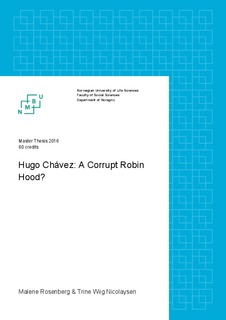| dc.description.abstract | When Hugo Chávez became president of Venezuela, he came with the promise to eradicate corruption and clean up politics. However, research shows that the level of corruption in Venezuela has actually risen after Chávez came to power. A question thus emerges: Why has Venezuela’s level of corruption increased after Chávez became president? Furthermore, neither political institutions nor the population have held Chávez accountable for violating his promise, despite the fact that corruption seem to penetrate the entire system and that Venezuelans have overthrown corrupt politicians before. This makes us wonder, how did Chávez avoid being held accountable for corruption during his rule?
As this research takes the form of a historical case study, we have applied several different theoretical lenses to obtain a deeper understanding how corruption unfold in the Venezuelan context as well as understanding why Chávez has not been held accountable through checks and balances. To answer our questions, we have used a mixed method approach to analyze and discuss the findings. This has enabled us to triangulate our findings, as well as giving us the opportunity to explore material which is not always easily captured by one approach alone. Firstly, we analyzed the relationship between democracy, media and corruption. Secondly, we looked at how the division and centralization of power affect democratic tools. Thirdly, we saw corruption in the light of economical explanations. And fourthly, we examined the relationship between natural resources and corruption.
Our main findings were that corruption has increased with the deterioration of the democratic tools intended to suppress it. The power has been centralized into the hands of the presidency, and economic freedom has been suppressed. This has severely harmed checks and balances, and allowed corruption to thrive. Yet, even though corruption would theoretically entail more inequality and less prosperity, the findings suggest otherwise. In fact, as oil revenues are so great in Venezuela, there is room for both corruption and high social spending. This further leads us to understand why Chávez has not been held accountable by his people either. If a population has the impression of politics being corrupt by nature, which in respect to Venezuela’s political history is reasonable to assume, they are less likely to criticize the one corrupt politician whose policies actually benefit them. In relation to the poor, he became like a modern day Robin Hood. Further, as the majority of Venezuelan voters remain poor, this explains why Chávez continued to win elections.
Overall, this study reveals why and how a democratic government can be utterly corrupt, and still not be held accountable. | nb_NO |

